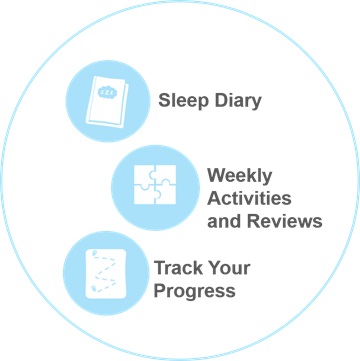 Better Nights, Better Days
Better Nights, Better Days During COVID-19
During COVID-19
Read below to learn about our most recent BNBD study
Scaling-out Better Nights, Better Days to help children and families go from surviving to thriving during COVID-19
Better Nights, Better Days is an evidence-based online program to support parents of children ages 1-10 years old who experience sleeping problems including difficulties falling asleep, staying asleep, and waking too early. We modified this program so that it could be used during the current COVID-19 pandemic (see below for how we did this).
A national team of investigators are conducting a study to understand if Better Nights, Better Days improves the sleep, mental health, wellbeing, and family resiliency in children and parents during the COVID-19 pandemic, and test how to scale-out the Better Nights, Better Days program to support families across Canada.
We are recruiting 1000 families of children who experience sleeping problems to test the clinical effectiveness of Better Nights, Better Days during COVID-19 and evaluate the implementation of the program to scale-out Better Nights, Better Days across Canada. There is no cost for families to participate.
Interested in taking part? Click the "Apply" or “Can I Participate” icon to begin.
Healthcare Provider Resources
If you are a healthcare provider interested in referring patients to the study who may benefit from accessing the Better Nights, Better Days program, please feel free to download this study information sheet or share these study notices with families who may be eligible to participate.
Referral Notice with Contact Tear-Away Information
The Program
Modifications have been made to the original Better Nights, Better Days program to support families during the COVID-19 pandemic. Information has been integrated to help improve parents’ sleep as well as their child’s. All participants will receive access to the program.
 Better Nights, Better Days
Better Nights, Better Days Program Sessions
Program Sessions
![]()
Pre-Session
Information on how the COVID-19 pandemic has affected the sleep of children and parents, as well as how sleep can be a resource to improve stress and coping.
![]()
Session 1: Introduction
Introduction to the program and information about how sleep works and how sleep problems develop.
Information for parents about adult characteristics of sleep; how sleep problems develop in adults, and a link to download an adult Sleep Diary from the National Sleep Foundation.
![]()
Session 2: Healthy Sleep Practices
Learn about healthy sleep practices and routines, and how doing things differently during the day and at night can help your child sleep better.
Includes prompts for parents to consider the influence of factors on their own sleep, including their own sleep schedules, bedtime routines, sleep location, use of electronics before bed, exercise and diet, positivity, and sleep associations.
![]()
Session 3: Settling to Sleep
Focus on problems settling to sleep independently at naptime and at bedtime.
Includes evidence-based strategies recommended for adults on improving their ability to fall asleep.
![]()
Session 4: Going Back to Sleep
Focus on using tools to help with night-wakings and what to do if your child wakes too early in the morning.
Includes evidence-based strategies recommended for adults to manage to night wakings, napping, and early morning awakenings.
![]()
Session 5: Looking Back and Ahead
Review your goals and progress you’ve made during the program, and develop a plan for the future.
Includes descriptions of other sleep problems that adults may experience and guidance for when adults should contact their healthcare provider for assessment and treatment.
 Better Nights, Better Days
Better Nights, Better Days Program Tools
Program Tools

Sleep Diary
Fill out a daily online sleep diary to track your results and see patterns in your child’s sleep and behaviour as you complete the sessions.
Weekly Activities and Reviews
Complete activities that will help you make positive changes to improve your child’s sleep. For instance, learn how to create sleep routines, a healthy sleep environment, and practice techniques to reduce stress.
Track Your Progress
Throughout the program, you'll receive feedback on the positive changes that you're making to your child's sleep.
Parent Testimonials
“Your program was a game changer for our child. Night and day the difference it made! We were at our wits end, fighting constantly with our child and ourselves due to sleep deprivation (our child only slept 2hr/24hrs), and then after working with her through your program, she now sleeps 10.5hr a night and is a happy kid in the day. We can't speak more highly of your program and are constantly recommending it to parents in need.”
- Ontario, child 3 years old
“When following tips from Better Nights, Better days, our house runs more smoothly, people are all in better moods and the day goes along in a happier way."
- New Brunswick, child 7 years old
"The best part was that it made a huge difference in improving the quality of sleep we are now getting as a family.”
- British Columbia, child 1 year old
“I loved the program, the modules were easy to follow and kept us on track.”
- Saskatchewan, child 4 years old
The Team
Principal Investigator
Penny Corkum, PhD, Registered Psychologist and Professor, Departments of Psychology & Neuroscience, and Psychiatry, Dalhousie University
Affiliated Staff, Department of Pediatrics, IWK Health Centre
Principal Knowledge User
Dr. Célyne Bastien, PhD, School of Psychology, Laval University, Québec, Québec
President, Canadian Sleep Society
Co-Investigators
Dr. Elizabeth Keys, PhD, University of British Columbia
Ms. Nicole MacKenzie, Dalhousie University
Dr. Melanie Barwick, PhD, Hospital for Sick Children Research Institute
Dr. Cary Brown, PhD, University of Alberta
Dr. Evelyn Constantin, MD, McGill University
Dr. Roger Godbout, PhD, Université de Montréal
Dr. Reut Gruber, PhD, McGill University
Dr. Paul Ralph, PhD, Dalhousie University
Dr. Graham Reid, PhD, Western University
Dr. Isabel Smith, PhD, Dalhousie University
Dr. Robyn Stremler, PhD, University of Toronto
Dr. Shelly Weiss, MD, Hospital for Sick Children
Dr. Ramesh Venkat, PhD, Saint Mary’s University
Collaborators
Dr. Ana Hanlon-Dearman, University of Manitoba
Dr. Sarah Shea, MD, Dalhousie University
Dr. Osman Ipsiroglu, MD, University of British Columbia
Dr. Manisha Witmans, PhD
